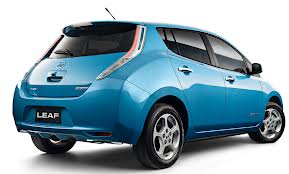Nissan launched its all-electric LEAF three years ago today in London. I was there, and I shared the general feeling of optimism.
That brave new dawn turned into a very dingy dusk, punctuated by long periods of darkness. The range anxiety skeptics prevailed, and sales figures were beyond sluggish. Since 2009 fewer than 4000 electric cars, principally the LEAF had been sold in the UK; worldwide the total is 62,000.
So is this an anniversary to celebrate? In a tentative way, it is. For one thing, sales of the LEAF have accelerated recently, and considerably in some countries. In Norway, during April 2013, the Leaf was the second best selling car, beaten only by the VW. In the USA the sales total is past 25,000. And in the UK the first, updated, models are about to come off the production line in Sunderland. And there is a new, lower price option.
If range anxiety is the reason the people not buying an electric car, it’s much less of an issue than it was in was in 2010. According to www.nextgreencar.com/electric-cars/charging-points.php, there are now over 3000 electric vehicle (EV) chargers in the UK. There are the slow sort that give you enough power to get home in a few hours (6-8 hours for a full charge); “fast” points take 3-4 hours; and “rapid” deliver an 80% charge in 30 mins. Read the blogs of Robert Llewelyn, who routinely drives from his home in the Cotswolds to London and further, without any inconvenience, and who has never run out of charge in well over 20,000 miles of driving. Try this one, for example.
Other possible solutions that could be available in the forseeable future, and now being actively explored include wireless, in-road charging.
Why is it vital that we drive more electric cars? 97% of peer-reviewed papers on climate change conclude that man is the principal cause. This month (May 2013) the concentration of carbon dioxide (CO2) gas in the in the Earth’s atmosphere passed 400ppm (parts per million) for the first time in human history. Many commentators agree that urgent and rapid action is needed to reduce our C02 output to head off potentially disastrous consequences of climate change.
In the UK cars accounted for 14% of total CO2 emissions in 2011. The Committee on Climate Change, an independent body which advises the government, wants to see 1.7m electric vehicles on the roads by 2020, if the UK is to meet its greenhouse gas targets.
We are a long way off meeting that target. Electric cars are expensive and many people have sought to reduce their carbon footprint by buying one of the many, much cheaper, high mileage cars now on the market. (Personal disclosure: as a freelance journalist, writing mainly blogs such as this for which I am not paid, I cannot afford one)
The good news is that the price of the LEAF is coming down. You can still buy the Sunderland-built version, launched in April 2013, outright, for £20,990, but a new “Flex” ownership plan lets buyers pay as little as £15,990 (after the £5,000 plug-in grant) up-front. They then lease the battery separately, from £70 per month, depending on the length of the contract and mileage covered.
The new Leaf has a shorter charging time and longer driving range. The US Environmental Protection Agency (EPA) has confirmed that the car’s range is about 15 percent better than the previous model. It gives the miles per gallon-equivalent rating of 115, up from 99 MPGe. The single-charge range distance is up two miles – to 75.
That 115 figure refers to electricity produced by the typical mix of fossil fiuels in a power station. Using renewable energy, the car can be considered truly carbon free. The energy produced in a year by the average rooftop array of solar panels would give a Leaf driver about 7000 Co2-free miles.
The recent rise in sales is worth examining more closely. Since the LEAF launched in the US in December 2010, sales have averaged roughly 860 per month. With the introduction of the cheaper 2013 US-built LEAF, that average has climbed significantly. In the first 4 months of 2013, sales averaged 1,369 units per month. In March 2013 US sales checked in at 2,236 cars.
Sales of the LEAF in Norway only began about 18 months ago, and since then more than 4,500 of the EVs have been sold. Norway has introduced strong incentives to tempt drivers to buy electric cars, which include reducing EV VAT to zero, installing electric car-only car parks, and allowing the use of bus lanes.
Norway leads the world in electric vehicle sales per capita, even though the nation has big oil reserves. Oslo, recently decided to increase the rate of EV charging points from about 100 per year, as it is now, to over 200 per year. That rate will be maintained for at least the next four years.
In the near future BMW is launching its “i” electric brand, the i3 and i8, shortly. Will that be the trigger for electric car takeoff, Mark 3? 2010 was supposed to be the year of of the electric car, then it was 2011, and then ‘12. Maybe it will be 2013.

